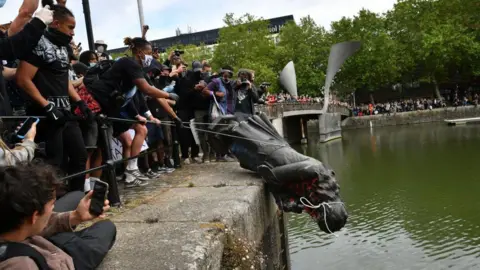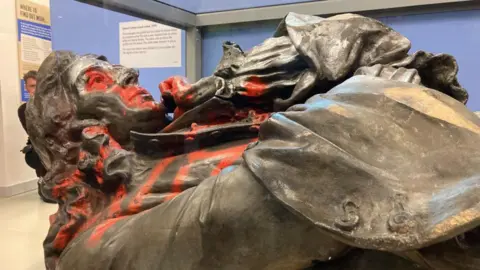Councillors reject Colston statue plinth wording again
 PA
PACouncillors have refused for the second time to accept the suggested words for a new plaque where a slave trader's statue once stood.
Bristol City Council's development control committee voted 3-2 in February against the text for the plinth of the Edward Colston statue, toppled during a Black Lives Matter protest in 2020, "celebrating him as a city benefactor".
But councillors were presented with the same wording on Wednesday as they had rejected, with an explanation from the We Are Bristol History Commission about why the words were chosen.
One committee member said the wording was still "unacceptable".
The proposed plaque would have said: “On November 13, 1895, a statue of Edward Colston (1636–1721) was unveiled here celebrating him as a city benefactor.
“In the late twentieth and early twenty-first century, the celebration of Colston was increasingly challenged given his prominent role in the enslavement of African people.
“On June 7, 2020, the statue was pulled down during Black Lives Matter protests and rolled into the harbour.
“Following consultation with the city in 2021, the statue entered the collections of Bristol City Council’s museums.”

After voting against the officers’ recommendation to approve the wording, the committee decided unanimously to defer the application until their next meeting on 5 June.
Councillor Guy Poultney said: "It is to be regretted that the council felt they couldn't compromise, that they couldn't deviate from the wording the committee saw last time.
"Given that the committee made it very clear the wording was unacceptable, I don't see how it has become more acceptable now," he added.
He said the committee suggested removing the references to Colston being celebrated as a benefactor, and also to Black Lives Matter as they were not purely factual or neutral.
Another councillor, Lorraine Francis, told the meeting she was "uncomfortable" with the wording.
"We're being told 'this is what it is, you need to accept it'."
Her preference would be the simple statement: "The statue of Edward Colston once stood here, 1895-2020."
Other councillors were more supportive.
Lesley Alexander said the proposed text was simple and factual.
She said: “The average tourist is not looking for a history lesson, he wants to know why we’ve got an empty plinth, and if he wants more information, it says it can be viewed at the museum and more information given, so it’s fine as it is.”
